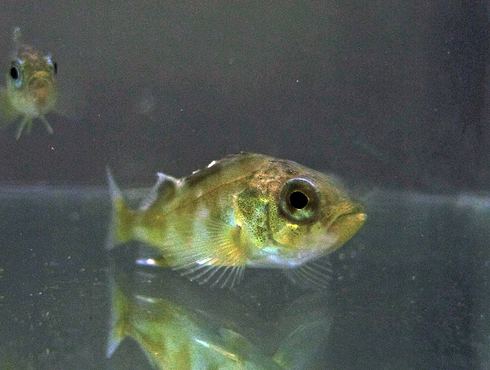Please note: Osher Rainforest will be closed for maintenance Jan. 14–16.
Science News
Ocean Acidification Stresses Fish
December 9, 2013
by Molly Michelson

Climate change got you anxious? You’re not alone. Researchers at Scripps Institution of Oceanography have found that ocean acidification, a direct result of increased CO2 in the atmosphere, makes fish anxious.
The absorption of human-produced carbon dioxide into the world’s oceans is causing surface waters to decline in pH, corresponding to a rise in acidity. And while evidence of the effects of ocean acidification disrupting the growth of shells and skeletons of certain marine animals has been observed in lab experiments, consequences to other organisms are largely unknown.
Martin Tresguerres and his colleagues wanted to understand the effects of acidification on California rockfish (Sebastes diploproa), an important commercial species. First, the scientists determined that juvenile rockfish administered with an anxiety-inducing drug (anxiogenic) prefer the dark. Instead of moving in between darker and lighter areas of the ocean (or during the experiment, a tank) as normal fish do, the anxious fish remain in the dark and seldom venture into the light.
Next, the researchers found that rockfish exposed to acidified ocean conditions for one week also prefer the dark area of the tank, suggesting that they experience significantly more anxiety than their normal seawater counterparts. In addition, rockfish exposed to acidified ocean conditions remained anxious a full week after being placed in seawater with normal carbon dioxide levels. In fact, it took twelve days of being in normal seawater before the anxious fish behaved like the control group and resumed normal behavior.
The researchers say the anxiety is traced to the fish’s sensory systems, and specifically GABAA (neural gamma-aminobutyric acid type A) receptors, which are also involved in human anxiety levels. Exposure to acidified water leads to changes in the concentrations of ions in the blood (especially chloride and bicarbonate), which reverses the flux of ions through the GABAA receptors. The end result is a change in neuronal activity that is reflected in the altered behavioral responses described in this study.
“These results are novel and thought-provoking,” says Tresguerres, “because they reveal a potential negative effect of ocean acidification on fish behavior that can possibly affect normal population dynamics and maybe even affect fisheries.”
Tresguerres says anxious behavior is a concern for juvenile rockfish because they live in highly dynamic environments such as kelp forests and drifting kelp paddies that offer variable lighting and shading conditions.
“If the behavior that we observed in the lab applies to the wild during ocean acidification conditions, it could mean that juvenile rockfish may spend more time in the shaded areas instead of exploring around,” says Tresguerres. “This would have negative implications due to reduced time foraging for food, or alterations in dispersal behavior, among others.”
(A study last year found similar effects for clownfish. That’s right, just like Nemo, and although his stressful story turned out fine in the end, not all ocean inhabitants might be as lucky.)
If you’ve seen rockfish in the Academy's Steinhart Aquarium, they’re pretty chill and it would be hard to imagine them stressed out. But a changing ocean can do that to you, especially if that’s where you live.
The research was published last week in the Proceedings of the Royal Society B (Biological Sciences).
Image: Scripps Institution of Oceanography